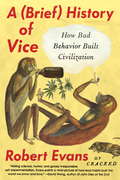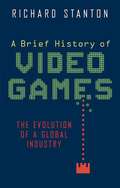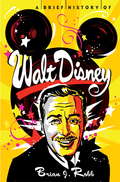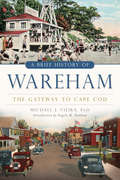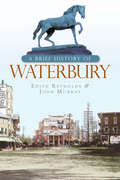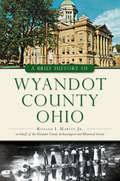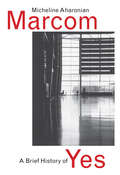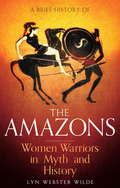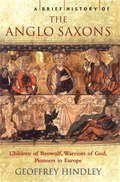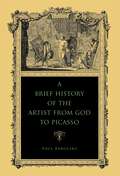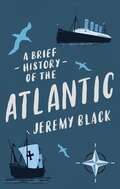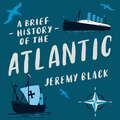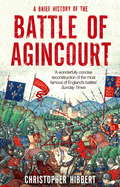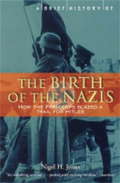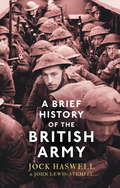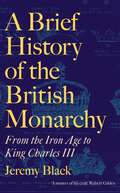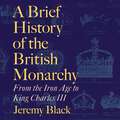- Table View
- List View
A Brief History of Vice: How Bad Behavior Built Civilization
by Robert Evans"Mixing science, humor, and grossly irresponsible self-experimentation, Evans paints a vivid picture of how bad habits built the world we know and love."--David Wong, author of John Dies at the EndHistory has never been more fun--or more intoxicating. Guns, germs, and steel might have transformed us from hunter-gatherers into modern man, but booze, sex, trash talk, and tripping built our civilization. Cracked editor Robert Evans brings his signature dogged research and lively insight to uncover the many and magnificent ways vice has influenced history, from the prostitute-turned-empress who scored a major victory for women's rights to the beer that helped create--and destroy--South America's first empire. And Evans goes deeper than simply writing about ancient debauchery; he recreates some of history's most enjoyable (and most painful) vices and includes guides so you can follow along at home. You'll learn how to: * Trip like a Greek philosopher. * Rave like your Stone Age ancestors. * Get drunk like a Sumerian. * Smoke a nose pipe like a pre-Columbian Native American.A celebration of the brave, drunken pioneers who built our civilization one seemingly bad decision at a time, A Brief History of Vice explores a side of the past that mainstream history books prefer to hide.From the Trade Paperback edition.
A Brief History of Video Games
by Richard StantonThis Brief History provides a unique look at the history and culture of video games, starting with the 1960s classics like Pong to modern favorites such as Grand Theft Auto V and Bioshock. Focusing on creative and scientific advances between 1962 and today, A Brief History of Video Games offers a global perspective on gaming's past and its cutting-edge future with the evolution of virtual reality, 3D graphics, and thought-interface technology. It also addresses the design process from concept to packaging, considers the influence of manga and anime, and explores the relationship between video games and movies.
A Brief History of Walt Disney
by Brian J. RobbBoth a fascinating account of Walt Disney?s own significant artistic creations, from the iconic Mickey Mouse to the groundbreaking Snow White in 1937, and an insightful history of the hugely successful entertainment behemoth he created, from Dumbo to Pixar?s Toy Story, as well as the hugely popular theme parks. But Disney?s dark side is also explored: his disputed parentage; industrial disputes; his work for the FBI; and his anti-Communist and allegedly racist and antisemitic views. The company Disney built is today stronger than ever, encompassing not only the ongoing legacy of Disney animation, but also acting as the guardian of other well-loved creative endeavours, such as Pixar, The Muppets, Marvel Comics and now Star Wars. Sections include `Before Mickey: The Road to the Mouse House?, covering from 1901 to 1945 ? the creation of Mickey Mouse, the creation of the world?s first full-length animated feature film, the Golden Age of animation and Disney?s help for the American war effort, despite labour disputes; `Disney Studios: The Disney Genius? ? difficult times, theme parks and television, live-action movies, including Mary Poppins; `Animation?s Second Coming?, from the Lady and the Tramp to The Sword in the Stone, and Walt Disney?s death; `After Walt: The Disney Legacy? ? family attempts to keep the studio afloat, decline and the loss of lustre in the 1970s and 1980s; `Disney Resurgent? ? a triumphant rebirth under new management with Who Framed Roger Rabbit? The Lion King and other blockbuster hits; `From Eisner to Iger? ? the corporate battle for the soul of Disney; `Disney Goes Digital? ? from Pixar to Star Wars, via Marvel Comics and The Muppets, Disney buyy up other studios, themselves often enough inspired by the original.
A Brief History of Walt Disney (Brief Histories)
by Brian RobbBoth a fascinating account of Walt Disney’s own significant artistic creations, from the iconic Mickey Mouse to the groundbreaking Snow White in 1937, and an insightful history of the hugely successful entertainment behemoth he created, from Dumbo to Pixar’s Toy Story, as well as the hugely popular theme parks. But Disney’s dark side is also explored: his disputed parentage; industrial disputes; his work for the FBI; and his anti-Communist and allegedly racist and antisemitic views.The company Disney built is today stronger than ever, encompassing not only the ongoing legacy of Disney animation, but also acting as the guardian of other well-loved creative endeavours, such as Pixar, The Muppets, Marvel Comics and now Star Wars.Sections include ‘Before Mickey: The Road to the Mouse House’, covering from 1901 to 1945 – the creation of Mickey Mouse, the creation of the world’s first full-length animated feature film, the Golden Age of animation and Disney’s help for the American war effort, despite labour disputes; ‘Disney Studios: The Disney Genius’ – difficult times, theme parks and television, live-action movies, including Mary Poppins; ‘Animation’s Second Coming’, from the Lady and the Tramp to The Sword in the Stone, and Walt Disney’s death; ‘After Walt: The Disney Legacy’ – family attempts to keep the studio afloat, decline and the loss of lustre in the 1970s and 1980s; ‘Disney Resurgent’ – a triumphant rebirth under new management with Who Framed Roger Rabbit? The Lion King and other blockbuster hits; ‘From Eisner to Iger’ – the corporate battle for the soul of Disney; ‘Disney Goes Digital’ – from Pixar to Star Wars, via Marvel Comics and The Muppets, Disney buyy up other studios, themselves often enough inspired by the original.
A Brief History of Wareham: The Gateway to Cape Cod (Brief History)
by Michael J. VieiraWareham, Massachusetts--the Gateway to the Cape--is a small town steeped in rich history. The Wampanoags, or "People of the First Light," first used the area of Wareham as a summer home. Later, this area became part of the colonies' first permanent settlement, Plymouth. Since its incorporation in 1739, Wareham has persevered and flourished through the American Revolution, the War of 1812 and the Industrial Revolution. In the nineteenth century, the seaside town quickly became a tourist destination and experienced an early economic boom as salt works, manufacturing mills, ironworks, nail factories and cranberry harvesting developed in the region. With over fifty-four miles of scenic waterfront, Wareham has drawn travelers to its shores for centuries. Join author Michael J. Vieira as he deftly navigates the history of this vibrant community.
A Brief History of Waterbury
by John Murray Edith ReynoldsIn 1681, just twenty-eight humble log cabins built around a marshy green made up what is today Waterbury, Connecticut. The town flourished, and by 1850, its brass- and button-making industries welcomed the Industrial Revolution. When the call came for the Civil War and World Wars I and II, Waterbury gave generously: buttons, to adorn United States military uniforms; and young soldiers, to fight for freedom and become heroes. A Brief History of Waterbury details the ebb and flow of this Connecticut town, the climb to its height, the struggles through adversity and scandal and the glory of modern-day triumphs. In this endlessly intriguing account, authors Edith Reynolds and John Murray uncover the true reaches of Waterbury's dynamic spirit.
A Brief History of Wyandot County, Ohio (Brief History)
by Ronald I. Marvin Jr. Wyandot County Archaeological and Historical SocietyOnce home to the powerful Wyandotte Nation, Wyandot County emerged from lands surrounding the Grand Reserve. The landscape has evolved dramatically, from the backbreaking work of draining marshland to the creation of solar farms centuries later. The Mission Church, Indian Mill and Colonel Crawford Monument link the county to its rich heritage, and the Lincoln Highway connects it with the rest of the nation. The county has played host to General William Harrison, President Rutherford Hayes, Charles Dickens, Medal of Honor recipient Cyrus Sears and Neil Armstrong. Author Ronald I. Marvin Jr. explores several thousand years of Wyandot history from its earliest inhabitants to the set of the Shawshank Redemption.
A Brief History of Yes
by Micheline Aharonian MarcomMicheline Marcom describes her newest novel, A Brief History of Yes--her first since 2008's scathing and erotic The Mirror in the Well--as a "literary fado," referring to a style of Portuguese music that, akin to the American blues, is often melancholic and soulful, and encapsulates the feeling of what the Portuguese call saudade--meaning, loosely, yearning and nostalgia for something or someone irrepreably lost. A Brief History of Yes tells the story of the break-up between a Portuguese woman named Maria and an unnamed American man: it is a collage-like, fragmentary novel whose form captures the workings of attraction and grief, proving once again that American letters has no better poet of love and loss than Micheline Aharonian Marcom.
A Brief History of Yes
by Micheline Aharonian MarcomMicheline Marcom describes her newest novel, A Brief History of Yes--her first since 2008's scathing and erotic The Mirror in the Well--as a "literary fado," referring to a style of Portuguese music that, akin to the American blues, is often melancholic and soulful, and encapsulates the feeling of what the Portuguese call saudade--meaning, loosely, yearning and nostalgia for something or someone irrepreably lost. A Brief History of Yes tells the story of the break-up between a Portuguese woman named Maria and an unnamed American man: it is a collage-like, fragmentary novel whose form captures the workings of attraction and grief, proving once again that American letters has no better poet of love and loss than Micheline Aharonian Marcom.
A Brief History of the Amazons: Women Warriors in Myth and History (Brief Histories Ser.)
by Lyn Webster Wilde'Golden-shielded, silver-sworded, man-loving, male-child slaughtering Amazons,' is how the fifth-century Greek historian Hellanicus described the Amazons, and they have fascinated humanity ever since. Did they really exist? For centuries, scholars consigned them to the world of myth, but Lyn Webster Wilde journeyed into the homeland of the Amazons and uncovered astonishing evidence of their historic reality.North of the Black Sea she found archaeological excavations of graves of Iron Age women buried with arrows, swords and armour. In the hidden world of the Hittites, near the Amazons' ancient capital of Thermiscyra in Anatolia, she unearthed traces of powerful priestesses, women-only religious cults, and an armed, bisexual goddess - all possible sources for the ferocious women.Combining scholarly penetration with a sense of adventure, Webster Wilde has produced a coherent and absorbing book that challenges preconceived notions, still disturbingly widespread, of what men and women can do.
A Brief History of the Amazons: Women Warriors in Myth and History (Brief Histories)
by Lyn Webster Wilde'Golden-shielded, silver-sworded, man-loving, male-child slaughtering Amazons,' is how the fifth-century Greek historian Hellanicus described the Amazons, and they have fascinated humanity ever since. Did they really exist? For centuries, scholars consigned them to the world of myth, but Lyn Webster Wilde journeyed into the homeland of the Amazons and uncovered astonishing evidence of their historic reality.North of the Black Sea she found archaeological excavations of graves of Iron Age women buried with arrows, swords and armour. In the hidden world of the Hittites, near the Amazons' ancient capital of Thermiscyra in Anatolia, she unearthed traces of powerful priestesses, women-only religious cults, and an armed, bisexual goddess - all possible sources for the ferocious women.Combining scholarly penetration with a sense of adventure, Webster Wilde has produced a coherent and absorbing book that challenges preconceived notions, still disturbingly widespread, of what men and women can do.
A Brief History of the Anglo-Saxons
by Geoffrey HindleyStarting AD 400 (around the time of their invasion of England) and running through to the 1100s (the 'Aftermath'), historian Geoffrey Hindley shows the Anglo-Saxons as formative in the history not only of England but also of Europe. The society inspired by the warrior world of the Old English poem Beowulf saw England become the world's first nation state and Europe's first country to conduct affairs in its own language, and Bede and Boniface of Wessex establish the dating convention we still use today. Including all the latest research, this is a fascinating assessment of a vital historical period.
A Brief History of the Anglo-Saxons (Brief Histories)
by Geoffrey HindleyStarting AD 400 (around the time of their invasion of England) and running through to the 1100s (the 'Aftermath'), historian Geoffrey Hindley shows the Anglo-Saxons as formative in the history not only of England but also of Europe. The society inspired by the warrior world of the Old English poem Beowulf saw England become the world's first nation state and Europe's first country to conduct affairs in its own language, and Bede and Boniface of Wessex establish the dating convention we still use today. Including all the latest research, this is a fascinating assessment of a vital historical period.
A Brief History of the Artist from God to Picasso (G - Reference, Information and Interdisciplinary Subjects)
by Paul BarolskyIn A Brief History of the Artist from God to Picasso, Paul Barolsky explores the ways in which fiction shapes history and history informs fiction. It is a playful book about artistic obsession, about art history as both tragedy and farce, and about the heroic and the mock-heroic. The book demonstrates that the modern idea of the artist has deep roots in the image of the epic poet, from Homer to Ovid to Dante. Barolsky’s major claim is that the history of the artist is inseparable from historical fiction about the artist and that fiction is essential to the reality of the artist’s imagination.
A Brief History of the Atlantic (Brief Histories)
by Jeremy BlackThe Atlantic has borne witness to major historic events that have drastically shaped humanity with each crossing of its path. In this broad and readable book, Jeremy Black takes the reader through its evolution to becoming one of the most important oceans in the world.Black discusses the importance of the Atlantic in relation to world history as well as addressing topics such as those bravest to attempt to cross the ocean before Columbus, the beginnings of slavery from 1400-1600, the struggle for control between empires in the 1600s, the way technology adapted with steamships to telegraph cables, the battle of the Falkland, and the Cold War.Black also touches on the Atlantic we know today, and the struggles it faces due to urgent global issues including climate change, pollution, and the trials of the economic rise in the Indo-Pacific world. If you have ever yearned to know more about this famed and vital ocean, this clear and concise history will be a key read as one of the first of its kind on its evolution to becoming an established world ocean.
A Brief History of the Atlantic (Brief Histories)
by Jeremy BlackThe Atlantic has borne witness to major historic events that have drastically shaped humanity with each crossing of its path. In this broad and readable book, Jeremy Black takes the reader through its evolution to becoming one of the most important oceans in the world.Black discusses the importance of the Atlantic in relation to world history as well as addressing topics such as those bravest to attempt to cross the ocean before Columbus, the beginnings of slavery from 1400-1600, the struggle for control between empires in the 1600s, the way technology adapted with steamships to telegraph cables, the battle of the Falkland, and the Cold War.Black also touches on the Atlantic we know today, and the struggles it faces due to urgent global issues including climate change, pollution, and the trials of the economic rise in the Indo-Pacific world. If you have ever yearned to know more about this famed and vital ocean, this clear and concise history will be a key read as one of the first of its kind on its evolution to becoming an established world ocean.
A Brief History of the Atlantic (Brief Histories)
by Jeremy BlackThe Atlantic has borne witness to major historic events that have drastically shaped humanity with each crossing of its path. In this broad and readable book, Jeremy Black takes the reader through its evolution to becoming one of the most important oceans in the world.Black discusses the importance of the Atlantic in relation to world history as well as addressing topics such as those bravest to attempt to cross the ocean before Columbus, the beginnings of slavery from 1400-1600, the struggle for control between empires in the 1600s, the way technology adapted with steamships to telegraph cables, the battle of the Falkland, and the Cold War.Black also touches on the Atlantic we know today, and the struggles it faces due to urgent global issues including climate change, pollution, and the trials of the economic rise in the Indo-Pacific world. If you have ever yearned to know more about this famed and vital ocean, this clear and concise history will be a key read as one of the first of its kind on its evolution to becoming an established world ocean.
A Brief History of the Battle of Agincourt
by Christopher HibbertThere can be few military victories so complete, or achieved against such heavy odds, as that won by Henry V on 25 October 1415 against Charles VI's army at Agincourt. In the words of one contemporary French chronicler, it was the 'most disgraceful event that had ever happened to the Kingdom of France'.Christopher Hibbert's wonderfully concise account draws on the unusual number of contemporary sources available to historians to describe in lucid detail not only what happened, but how it happened. His classic account of the crushing defeat of the French at Agincourt combines historical rigour with a vigorous and very readable narrative style.
A Brief History of the Battle of Agincourt (Brief Histories)
by Christopher HibbertThere can be few military victories so complete, or achieved against such heavy odds, as that won by Henry V on 25 October 1415 against Charles VI's army at Agincourt. In the words of one contemporary French chronicler, it was the 'most disgraceful event that had ever happened to the Kingdom of France'.Christopher Hibbert's wonderfully concise account draws on the unusual number of contemporary sources available to historians to describe in lucid detail not only what happened, but how it happened. His classic account of the crushing defeat of the French at Agincourt combines historical rigour with a vigorous and very readable narrative style.
A Brief History of the Birth of the Nazis
by Nigel JonesThe birth pangs of Nazism grew out of the death agony of the Kaiser's Germany. Defeat in World War I and a narrow escape from Communist revolution brought not peace but five chaotic years (1918-1923) of civil war, assassination, plots, putsches and murderous mayhem to Germany. The savage world of the trenches came home with the men who refused to admit defeat and 'who could not get the war out of their system'. It was an atmosphere in which civilised values withered, and violent extremism flourished. In this chronicle of the paramilitary Freikorps - the freebooting armies that crushed the Red revolution, then themselves attempted to take over by armed force - historian and biographer Nigel Jones draws on little-known archives in Germany and Britain to paint a portrait of a state torn between revolution and counter revolution. Astonishingly, this is the first in-depth study of the Freikorps to appear in English for 50 years. Yet the figures who flit through its shadowy world - men like Röhm, Goering and Hitler himself - were to become frighteningly familiar just ten years after the turmoil that gave Nazism its fatal chance.
A Brief History of the British Army
by John Lewis-Stempel Jock HaswellThe story of the British Army has many sides to it, being a tale of heroic successes and tragic failures, of dogged determination and drunken disorder. It involves many of the most vital preoccupations in the history of the island - the struggle against Continental domination by a single power, the battle for Empire - and a cast pf remarkable characters - Marlborough, Wellington and Montgomery among them. Yet the British, relying on their navy, have always neglected their army; from the time of Alfred the Great to the reign of Charles II wars were fought with hired forces disbanded as soon as conflict ended. Even after the stuggles with Louis XIV impelled the formation of a reulgar army, impecunious governments neglected the armed forces except in times of national emergency. In this wide-ranging account, Major Haswell sketches the medieval background before concentrating on the three hundred years of the regular army, leading up to its role in our own time. He presents an informed and probing picture of the organization of the army, the development of weaponry and strategy - and the everyday life of the British soldier through the centuries.John Lewis-Stempel has brought Major Haswell's classic work right up to date by expanding the section on the dissolution of empire to include a full account of Northern Ireland and the Falklands War. He has added a new chapter to cover the Gulf War, Bosnia, Afghanistan and Iraq; also the increasing role of special forces and the amalgamation of regiments.
A Brief History of the British Army (Brief Histories)
by John Lewis-Stempel Major Jock HaswellThe story of the British Army has many sides to it, being a tale of heroic successes and tragic failures, of dogged determination and drunken disorder. It involves many of the most vital preoccupations in the history of the island - the struggle against Continental domination by a single power, the battle for Empire - and a cast pf remarkable characters - Marlborough, Wellington and Montgomery among them. Yet the British, relying on their navy, have always neglected their army; from the time of Alfred the Great to the reign of Charles II wars were fought with hired forces disbanded as soon as conflict ended. Even after the stuggles with Louis XIV impelled the formation of a reulgar army, impecunious governments neglected the armed forces except in times of national emergency. In this wide-ranging account, Major Haswell sketches the medieval background before concentrating on the three hundred years of the regular army, leading up to its role in our own time. He presents an informed and probing picture of the organization of the army, the development of weaponry and strategy - and the everyday life of the British soldier through the centuries.John Lewis-Stempel has brought Major Haswell's classic work right up to date by expanding the section on the dissolution of empire to include a full account of Northern Ireland and the Falklands War. He has added a new chapter to cover the Gulf War, Bosnia, Afghanistan and Iraq; also the increasing role of special forces and the amalgamation of regiments.
A Brief History of the British Monarchy: From the Iron Age to King Charles III
by Jeremy BlackThe British monarchy is at a turning point. Concise and engaging, this book charts the very beginnings of British reign through to the longest serving monarch, Queen Elizabeth II - and looks forward to the reign of King Charles III.Much more than a linear history, this is the intertwined story of royalty and state, of divisions, invasions, rivalries, death and glory; the story of nation fates deeply tied with the personal endeavours of monarchs through the ages. Black expertly weaves together thematic chapters from the origins of monarchy, medieval times and sixteenth-century developments, to the crises of the seventeenth-century, settlement and imperialism, and the challenges of the modern age. Exploring the House of Wessex, the Norman Conquest, Henry VIII and the Tudors, Victorianism and key events such as abdication of Edward VIII, this book is a necessary and comprehensive guide to the British Monarchy and how it has shaped history - and our lives today.
A Brief History of the British Monarchy: From the Iron Age to King Charles III
by Jeremy BlackThe British monarchy is at a turning point. Concise and engaging, this book charts the very beginnings of British reign through to the longest serving monarch, Queen Elizabeth II - and looks forward to the reign of King Charles III.Much more than a linear history, this is the intertwined story of royalty and state, of divisions, invasions, rivalries, death and glory; the story of nation fates deeply tied with the personal endeavours of monarchs through the ages. Black expertly weaves together thematic chapters from the origins of monarchy, medieval times and sixteenth-century developments, to the crises of the seventeenth-century, settlement and imperialism, and the challenges of the modern age. Exploring the House of Wessex, the Norman Conquest, Henry VIII and the Tudors, Victorianism and key events such as abdication of Edward VIII, this book is a necessary and comprehensive guide to the British Monarchy and how it has shaped history - and our lives today.
A Brief History of the British Monarchy: From the Iron Age to King Charles III
by Jeremy BlackThe British monarchy is at a turning point. Concise and engaging, this book charts the very beginnings of British reign through to the longest serving monarch, Queen Elizabeth II - and looks forward to the reign of King Charles III.Much more than a linear history, this is the intertwined story of royalty and state, of divisions, invasions, rivalries, death and glory; the story of nation fates deeply tied with the personal endeavours of monarchs through the ages. Black expertly weaves together thematic chapters from the origins of monarchy, medieval times and sixteenth-century developments, to the crises of the seventeenth-century, settlement and imperialism, and the challenges of the modern age. Exploring the House of Wessex, the Norman Conquest, Henry VIII and the Tudors, Victorianism and key events such as abdication of Edward VIII, this book is a necessary and comprehensive guide to the British Monarchy and how it has shaped history - and our lives today.
